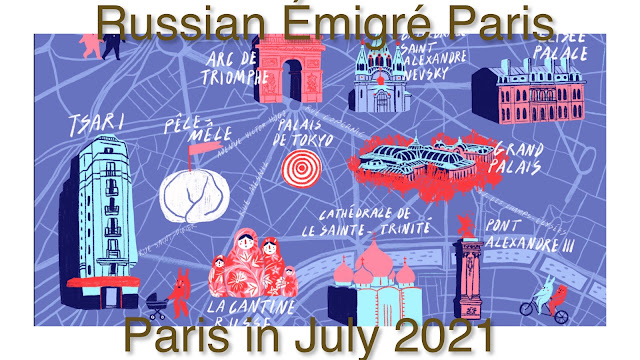“Requiem” - A Story by Gaito Gazdanov - first published in Novyi zhurnal 59 (1960),translated from Russian by Brian Karetnyk - 2018 -
This is part of my participation in Paris in July 2021- Hosted by Thyme for Tea
Works read so far for Paris in July 2021
- Lost in Paris by Elizabeth Thompson - 2021
- Loving Modigliani by Linda Lappin - 2020
- Russian Émirgé Short Stories from Bunin to Yanovsky - edited by Bryan Karetnky. 2018 - an overview
- Pancakes in Paris - Living The American Dream in France by Craig Carlson - 2016
- The Paris Apartment by Kelly Bowen- 2021
- The Paris Architect by Charles Belfoure - 2013
I posted on his probably most famous story “The Beggar” during Paris in July 2018
This story is included in Russian Émirgé Short Stories from Bunin to Vanovsky - edited by Brian Karetnyk. I highly reccomend this wonderful collection
GAITO (GEORGY IVANOVICH) GAZDANOV
Born: December 6, 1903, Saint Petersburg, Russia
He took part in Russia’s Civil War, serving in General Wrangel’s White Russian Army.
In 1923 he moved to Paris, stopping for a time in Romania. After a series of jobs he ended up driving a cab for 25 years, working nights and writing during the day He studied at the Sorbonne.
He published nine novels and over fifty short stories. His work sold well and he became financially independent.
He served in the Resistance during World War Two, edited an information publication with his Greek Odessan wife Faina Lamzaki. They married in 1936.
In 1953 he joined Radio Free Europe. He
produced a weekly program on Russian literature until his death in 1971
from Lung Cancer. He worked on numerous aspects of broadcast journalism.
His best work was after the war, largely on Russians in Paris
Died: December 5, 1971, Munich, Germany
“Requiem” is about Russian Émirgés who get rich my acting as middlemen for Germans purchasing suppliers. The opening shows power of his images
“It happened in the cruel and wretched period of the German occupation of Paris. Ever greater territories were being consumed by war. Hundreds of thousands were advancing along Russia’s frozen roads; wars were being waged in Africa; bombs were exploding across Europe. In the evenings Paris was plunged into an icy darkness; no streetlamps were lit, and there were no lights in any of the windows……
Most people barely have food but here is what the narrator finds when he visits an Émigré Cafe:
“one day I went to a little café in a suburb of Paris, where I had arranged to meet a casual acquaintance. It was evening, in the bitter winter of forty-two. The café was crowded. By the bar, well-dressed people – scarves, fur collars, pressed suits – were drinking cognac, liqueurs, coffee
with rum and eating ham sandwiches, the likes of which I had not seen in a long time. I later discovered the reason for this ham, this cognac and all the rest: the regulars of the café in which I happened to find myself were Russians who traded on the black market. Before the war, in those peaceful, well-fed times, the majority of these people had been unemployed – not because they couldn’t find work, but because they did not wish to work, on account of some incomprehensible, stubborn desire not to live as everyone else did: going to the factory, taking a room in some miserable hotel and drawing their wage once a fortnight.
Then everything changed for the Émigrés used to living in very low conditions
“ A change took place in the lives of these people. They were given a sudden, wonderful opportunity to get rich – without any especial effort and, essentially, almost without working. The German army and its affiliates would buy wholesale – no haggling – every item that was offered to them: boots and toothbrushes, soap and nails, gold and coal, clothes and axes, leads and machinery, cement and silk – everything. These Russians became intermediaries between the German buyers and the French merchants selling their goods to them”.
The narrator follows the life of a fellow Émigré.
There are three other stories by the author in the collection. For sure I will read them but I doubt if I will have time to post







2 comments:
I'm intrigued with stories that cover times and places with which I am unfamiliar. Like this one.
Hi Mel U, i really enjoy the stories you choose to share with us in Paris in July. The life of the Emigre in Paris is certainly one I know so little of.
Post a Comment